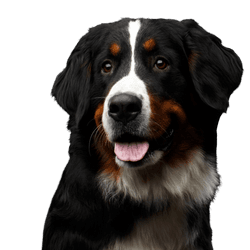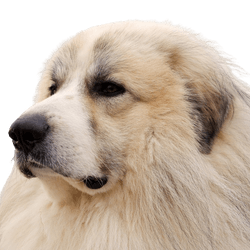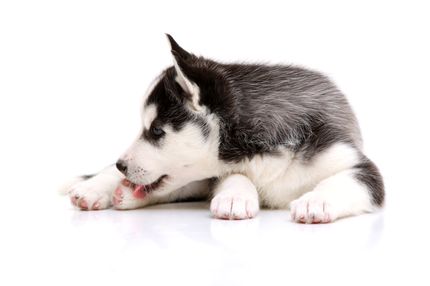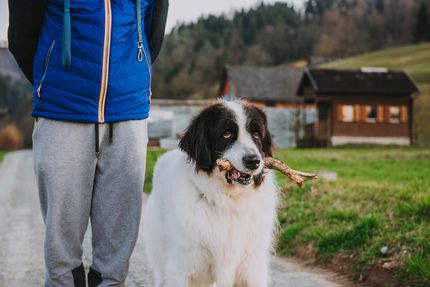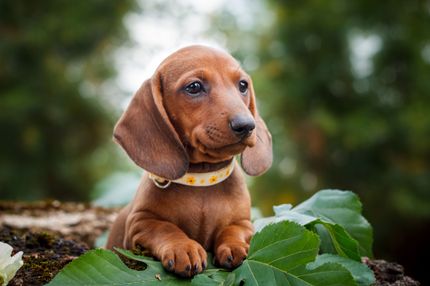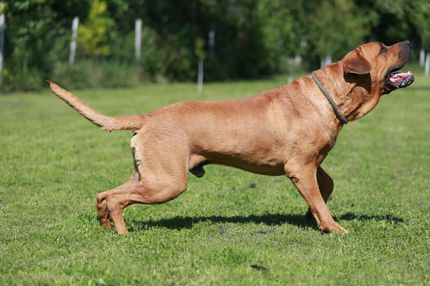Facts & Origin
Origin of the Great Bernese: A cross with alpine heritage
The Great Bernese is an impressive hybrid breed resulting from the deliberate crossing of a Great Pyrenees (Pyrenean Mountain Dog) with a Bernese Mountain Dog (Bernese Mountain Dog). Both original breeds come from mountainous regions of Europe and were kept for centuries as working and guard dogs. The idea behind this cross was to combine two strong, good-natured and family-friendly dogs with a strong protective instinct, resilience and a calm nature.
Breeding the Great Bernese has become particularly popular in North America, where so-called "designer dogs" have become increasingly popular - i.e. deliberately bred crossbreeds in which certain desired characteristics (appearance, temperament, health) are to be combined. The Great Bernese is often described as an ideal family dog with a gentle character, imposing appearance and protective instinct - a real gentle giant.
Name synonyms: diversity without a standard
The name Great Bernese is not an official breed name, but a colloquial combination of the two parent breeds. Common synonyms or alternative spellings are
Great Pyrenees Bernese Mix
Bernese Pyrenees
Pyrenean-Bernese mongrel
Great Bernese Mountain Dog (occasionally, but misleading as it is not a recognized breed)
As there is no official breed standard or breeding association, both the name and appearance vary greatly. Buyers should therefore always take a close look at the parent animals and breeding conditions before deciding on a puppy.
Criticism of the breeding of the Great Bernese
As with many designer dogs, there are some critical points about the Great Bernese that should be taken seriously. Although it is often claimed that mixed breeds are healthier ("hybrid vitality"), this is not automatically the case. Both original breeds carry genetic health risks, which can also occur in the offspring - especially if they are bred without health checks or knowledge.
Another point of criticism is the often commercially motivated breeding, where puppies are offered at high prices even though there is no official breed standard or proof of quality. Many dogs are also marketed visually, for example via social media, without buyers being adequately informed about their size, space requirements, care requirements and strong protective instinct.
Serious prospective buyers should therefore check carefully whether the breeder can provide health certificates for both parents, whether the litter has been well socialized and whether the aim of the breeding is the welfare and character of the dogs - and not just the sales price.
| Alternate Name | Great Pyrenees Bernese Mix, Bernese Pyrenees, Pyrenean-Bernese crossbreed |
| Origin | Switzerland - France |
| Life expectancy | 6 - 12 years |
| Care requirements | high-maintenance |
| Activity level | average |
| FCI group | not recognised |
| AKC group | not recognised |
| KC group | not recognised |
More Bernese Mountain Dog mixes
More Pyrenean Mountain Dog mixes
Attitude, character and temperament of the breed
Possible character traits
When properly socialized, the Great Bernese is considered to be extremely friendly, calm and loyal. It combines the gentle, familiar nature of the Bernese Mountain Dog with the watchful, independent and protective character of the Pyrenean Mountain Dog. This mixture results in a dog that is loving and affectionate on the one hand and independent and alert on the other.
Great Bernese are often fond of children, patient and very people-oriented. They tend to bond closely with their family and often show a calm, almost cozy behavior in the house. At the same time, they have a natural protective instinct that can manifest itself in alertness towards strangers - they are not aggressive, however, but rather aloof and observant.
Training should be calm, clear and consistent, but never harsh. The Great Bernese is intelligent, but also independent - authoritarian drill is of little use, positive reinforcement and clear rules are the key to a reliable companion.
Character
Care and health risks
As a large hybrid breed, the Great Bernese is not only visually impressive, but also has special care and health requirements. Its parents make it susceptible to certain hereditary diseases, which must be taken into account responsibly:
Hip and elbow dysplasia (HD/ED)
Bone diseases such as panosteitis in young dogs
Connective tissue weaknesses and heart problems, especially in large breeds
Cancer, especially lymphomas or osteosarcomas
Gastric torsion, as can occur in deep-chested breeds such as the Pyrenean Mountain Dog
Grooming involves regular brushing of the dense, long coat - at least 2-3 times a week, even daily during shedding. The coat tends to become matted, especially behind the ears, on the inside of the legs and under the neck. The ears should also be checked regularly and the claws trimmed.
An appropriate exercise program is just as important: not too much, not too little. Puppies and young dogs should not go for long walks or run up and down stairs to avoid overloading their joints. Adult dogs need plenty of space, but not high performance - quiet walks, light games and mental exercise are ideal.
What does this crossbreed look like?
The Great Bernese is generally a tall, long-haired dog that combines the most striking characteristics of both parent breeds. It can reach a shoulder height of 65 to 80 cm, with a weight between 45 and 60 kilograms, occasionally more in males. The build is strong, muscular and well proportioned, with a broad chest and sturdy limbs.
The coat is usually dense, long to semi-long and weatherproof, with a pronounced undercoat that protects it even in cold weather. Many color variations are possible, often with the typical tricolored markings of the Bernese Mountain Dog (black, white, brown), combined with the solid or creamy white tones of the Pyrenean Mountain Dog. Mixed forms with large white areas and dark markings also occur.
The appearance of the Great Bernese is usually friendly, calm and majestic - it impresses not only with its size, but also with its dignified appearance and gentle facial expressions. Many describe him as a "gentle giant" who, despite his power, is often very careful and attentive when interacting with people.
| Fur length | medium |
| Fur | flat coated - |
| Ear shape | Floppy Ear - Triangle |
| Tail | fanned out |
| Anatomy | massive, hefty, rugged, massive |
| Size ♀ | 58 - 74 cm |
| Weight ♀ | 36 - 48 kg |
| Size ♂ | 64 - 82 cm |
| Weight ♂ | 38 - 54 kg |
| Suitable For | - |
Known Diseases
Hip dysplasia (HD)
Hip dysplasia (HD) is a genetic condition in dogs where the hip joint is not shaped properly. This leads to pain, stiffness and restricted movement.
Cancer
May be common in older dogs.
Kidney disease
Symptoms of kidney disease in dogs: increased urination (polyuria) increased water intake. Inflammation of the mucous membrane of the mouth. Loss of appetite
Overweight
Often, unfortunately, the dogs very much under excess weight. But the dogs themselves are never to blame!
FAQ
-
The Bernese Mountain Dog and the Pyrenean Mountain Dog mix can grow quite large. Most adult animals weigh between 40-60 kg. However, some specimens can be larger or smaller than this value.
-
Within this hybrid breed, there is a wide variety of appearances. However, most dogs inherit the physical characteristics of both parent breeds. This means that they are likely to have a large, muscular body and a dense coat.
-
Yes, these dogs are usually great family dogs. They are generally gentle, loving and loyal. However, it is important to note that each individual dog is unique and their personality is influenced by a variety of factors, including their environment and socialization.
-
Yes, these dogs need a lot of space. A daily walk or hike is a good way to meet their exercise needs.
-
Yes, Great Bernese are generally good guard dogs. They are alert and bark to warn their family of strangers or perceived threats.
